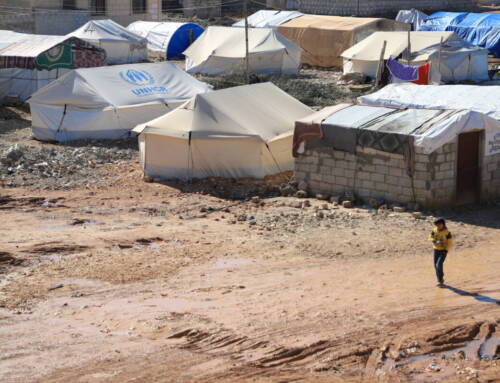Despite increased security, a series of bombings in regime-held Homs city leaves residents in ‘perpetual fear’
Rami al-Homsi, 35, lives in a regime-controlled district of Homs city […]
22 March 2017
Rami al-Homsi, 35, lives in a regime-controlled district of Homs city but says he nonetheless lives in a state of perpetual fear.
Two weeks after an improvised explosive device (IED) detonated inside a public bus driving through his neighborhood, al-Homsi is avoiding bus rides, markets and busy traffic circles.
“I know that I could be targeted in any place at any time,” he tells Syria Direct’s Noura Hourani and Mustafa al-Hammawi.
The March 14 bombing was the third to rock Homs in a month. In the first attack on February 25, claimed by Islamist rebel coalition Hay’at Tahrir a-Sham, suicide bombers targeted military intelligence and state security branches in the city.
The second and third attacks, the former of which targeted the residence of Homs governor Talal Barazi, remain unclaimed.
Despite tightened security at the checkpoints, which are in place in every corner of the city, “attacks continue to happen,” says al-Homsi, a father of five.
“We no longer consider our neighborhoods safe.”
Q: Describe the atmosphere in the city. How have residents responded to the bombings? What kind of precautions are they taking to avoid a possible attack in the future?
Residents are in a state of perpetual fear. No one expected for a bomb to be planted inside Wadi a-Dhahab and kill three innocent people and injure dozens.
Now we’re always uneasy. We no longer consider our neighborhoods safe.
People are worried that IEDs may get planted in shops, markets, buses or busy traffic circles.
We’re really anxious. These attacks instilled fear and terror in our hearts. We could be targeted at any time, especially considering the fact that the last attack targeted a bus right inside our neighborhood, in Wadi a-Dhahab.
We haven’t noticed a difference despite the security measures that the government has taken. Attacks continue to happen, as well as kidnappings.
We’re taking as many precautions as we can—avoiding crowded areas, staying at home during rush hour. Some residents have opted for walking instead of riding a bus or driving a car. They avoid leaving their homes unless it’s absolutely necessary.
We’re playing hide-and-seek with death.

Q: How would you describe the security situation in the city? Are many checkpoints in place to monitor who comes and goes?
The regime set up checkpoints everywhere in the city after it regained control of most neighborhoods in Old Homs in 2015.
There’s an officer in charge of each checkpoint, who residents [sarcastically] refer to as “President of the Republic.”
[Ed.: Officers have this nickname because they are given absolute authority over the checkpoint they control.]In reality, most officers are unscrupulous; they’re only concerned about making money, even if that means putting the neighborhood’s security and residents’ lives at stake.
By bribing the checkpoint officers, opposition fighters are able to sneak into regime neighborhoods and penetrate the regime’s security system.
Q: How has the government responded to the attacks?
After residents demanded a response to February’s attacks, the government fired the heads of the state and military security branches.
[Ed.: The Syrian government did in fact fire and replace those officials, Kurdish news outlet ARA News reported in February.]Security is really tight at the checkpoints leading to and from the city. Everyone is being searched, including women, children and the elderly.
The army also escalated its attacks on Waer and rebel areas in the north Homs countryside based on the belief that the terrorists originated in the rebel-held neighborhood and north Homs countryside. Somehow, rebels bring explosives from Waer into Homs city, even though the neighborhood is surrounded by government soldiers.
[Ed.: Waer, the last remaining rebel-held district in Homs city, signed a ceasefire agreement with the Syrian government in mid-March, Syria Direct reported.]Since 2015, residents have demonstrated against the governor of Homs, Talal Barazi, demanding his resignation. Demonstrations intensify after each explosion that happens in a regime neighborhood.
Some people are also accusing security forces of collaborating with the attackers. Others are accusing soldiers from Assad’s army of cooperating with the attackers and allowing them to enter the city.
Q: How have these attacks affected you personally?
I’m always imagining the worst. I can’t stop worrying from the time I leave my home to when I return.
I know that I could be targeted in any place at any time. I worry about my kids when they go to school. But I can’t prevent them from studying; I don’t want them to lose their futures just because I’m afraid.
Every day that passes without my family being harmed, I feel as though God has granted us more time to live.
Q: Checkpoint officials control the movement of people within the city, so they bear some responsibility for the attacks. In your opinion, is the government turning a blind eye to these officials?
Checkpoint officials are accepting bribes in return for letting people pass through without getting searched.
But unfortunately, this war has brought this country to the point of anarchy. People are only focused on money. Also, the state has given officers so much power that it can’t control them anymore.
This has given way to security breaches in regime areas.
I can’t say that the government is condoning these officers, but I’m positive that the government is aware of this. Now the government is focused on larger issues and doesn’t have time to track people down. But in my opinion, these individuals are distorting the government’s reputation.
Q: Has the government provided compensation to the relatives of those who were killed in the recent bombings? Are families asking for it?
Families have asked for compensation, especially those who lost their breadwinner. Most of the time they receive empty promises and their requests are delayed. They haven’t received substantial compensation; the government has only offered the most basic support.







